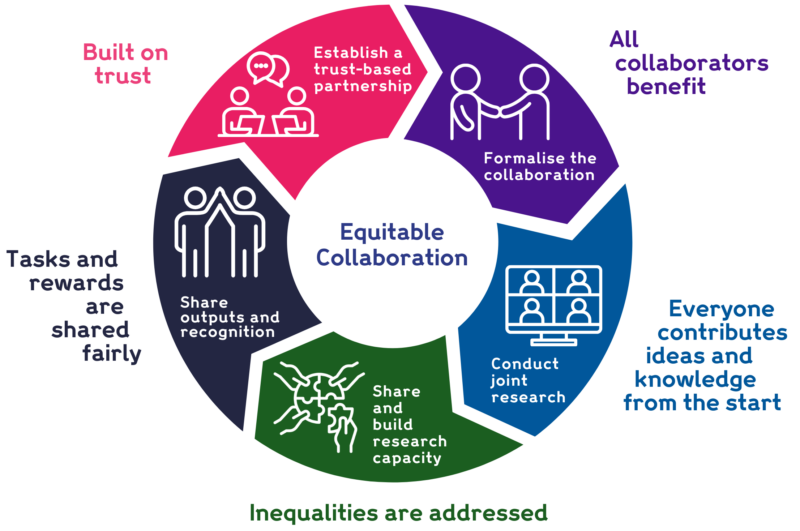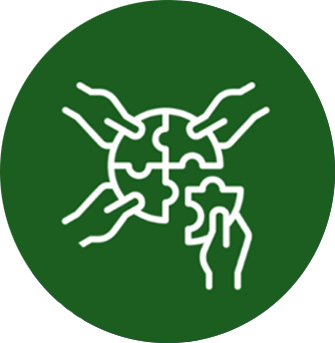Embedding equity in international research collaboration
International collaboration is central to the Wellcome Sanger Institute’s mission to ‘apply and explore genomic technologies at scale to advance understanding of biology and improve health’.
A significant portion of Sanger’s international research is performed in collaboration with partners based in low- and middle-income countries (LMICs). We believe that all our research should be designed and delivered in a way that is equitable for everyone involved in the research. This encompasses individual researchers, organisations and the communities taking part. For this reason, we encourage all our researchers to carefully consider how power dynamics can affect how research projects are conceived, funded, conducted and concluded to ensure that our science does not inadvertently exploit power and resource imbalances.
We encourage our scientists to seek meaningful input from collaborators at the design and initiation phase of research projects to ensure that our we deliver discoveries that will bring benefit to, and positively impact, partnering researchers and communities. In addition, we have developed a set of guidelines to help embed equity throughout the project’s duration and subsequent publication, data and knowledge sharing activities.
These guidelines are based on extensive engagement with a range of internal and external experts. They cover the five main stages of the research collaboration process, from partnership building through research design and execution to result dissemination – see the diagram below.

Schematic showing the five stages of research collaboration covered by the Embedding Equity in International Research Collaboration guidelines.
The goal of these guidelines are to help our scientists and research managers design, run and administer their project so that it is: “a mutually advantageous partnership built on trust, where all partners are intellectual contributors to the project who work together to ensure that tasks and rewards are shared in a fair manner that addresses inequalities.”
We developed these guidelines to support the Sanger Institute and its research teams to embed equity at all stages of our science. While we are delighted if other organisations would like to follow the same approach, we have no desire to impose our guidelines on collaborators.
It is also worth noting that our guidelines are not a rigid checklist of instructions, but are a suggested starting point towards a more detailed plan for equitable collaboration in a research project. We encourage our researchers to be responsive to their partners’ priorities and perspectives on equity and support our scientists to develop their research plans with partners on a case-by-case basis.
You can download the full report and short summary of the guidelines here.
Summary of guidance for the five main stages of an equitable research project

1. Establish a trust-based partnership
1A. Identify potential collaborators using a variety of means, such as encouraging research teams to approach you with ideas, leveraging networks, or building on previous relationships.
1B. Prioritise building trust with potential partners through transparency, receptive communication and by emphasising your personal commitment to research equity.
1C. Before entering into a formal collaboration, jointly agree a research agenda and co-develop equity-oriented research strategies with potential partners, ideally through in-person meetings.

2. Formalise the collaboration
2A. Submit a joint research proposal that allocates funding equitably and includes capacity building.
2B. Create simple-language non-legal ‘guiding principles of partnership’ with all partners, including junior researchers.
2C. Before formal legal negotiation, agree important high-level components with research partners. Afterwards, follow-up to ensure contracts are mutually beneficial.

3. Conduct joint research
3A. Build in regular meetings with partners to exchange updates on research progress and develop inclusive strategies for overcoming obstacles.
3B. Regularly evaluate progress towards equity-oriented goals, whilst establishing and maintaining routes for concerns to be raised.
3C. Foster an inclusive working environment where all partners are encouraged to voice ideas, priorities and concerns, and linguistic and cultural diversity is celebrated.

4. Share and build research capacity
4A. Develop sustainable and holistic ways to share skills and knowledge, support professional development, and create efficiencies in the research process.
4B. Work with partners to identify and overcome limitations in institutional and infrastructural capacity.
4C. Adapt roles and responsibilities throughout the research process to allow partners to take advantage of strengthened research capacity.

5. Share outputs and recognition
5A. Share recognition and reward with all partners, including publication authorship, external presentation opportunities, and shares of revenue and other benefits from commercialisation of intellectual property.
5B. Securely share data between partners throughout the project life cycle if possible, and ensure open (or managed) access to data and publications externally whilst addressing fears of scooping.
5C. Continue sustainable relationships with partners after the project has finished by keeping in touch and actively seeking further collaboration opportunities.